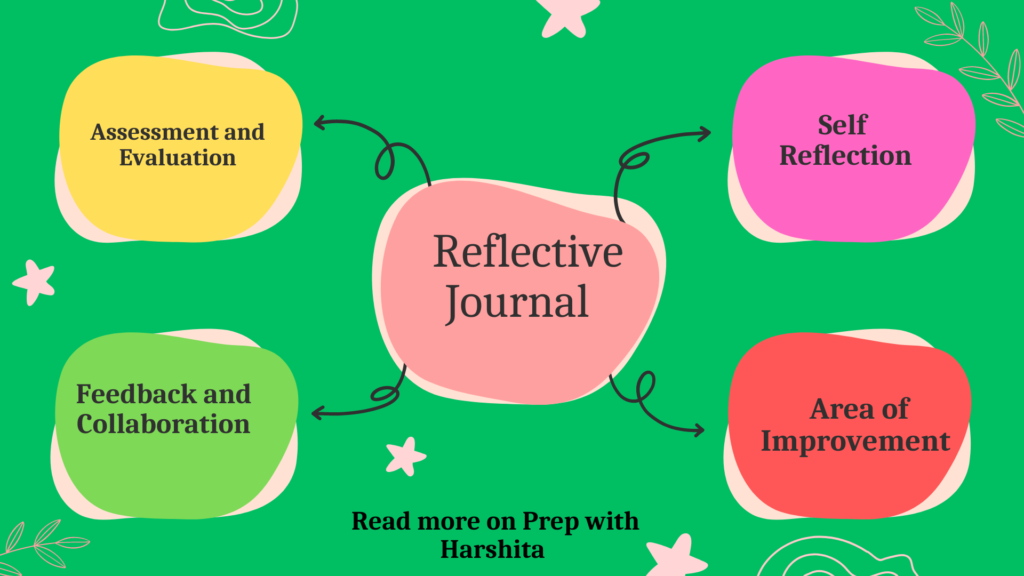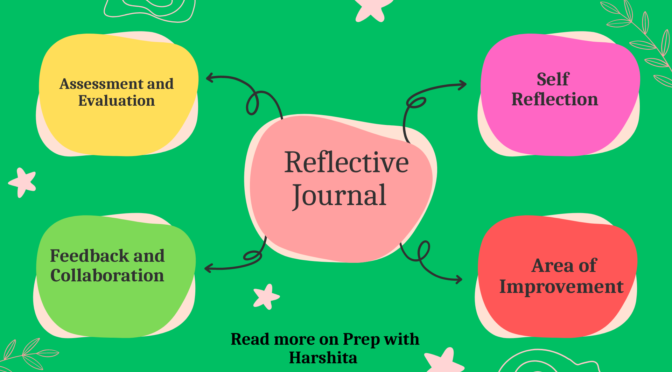A reflective journal is a type of personal writing that allows individuals to reflect on their experiences, thoughts, and feelings. It is a tool used for self-reflection and can be used for a variety of purposes, such as personal growth, learning, and professional development.
Reflective Journal Features :
- Reflective journaling typically involves regularly writing down thoughts and reflections about experiences or events, including what was learned, how the experience affected the writer, and what the writer could do differently in the future.
- The writing can be in any format, including freeform prose, lists, or bullet points, and can include images, sketches, or other visual aids.
- Reflective journaling is often used in education and training settings, such as in teacher training programs, to help students and professionals develop their critical thinking and self-awareness skills.
- It can also be used as a therapeutic tool to help individuals process and cope with difficult emotions or experiences.
Reflective Journal in Teaching :
It is a valuable tool for teachers to engage in self-reflection and professional development. By regularly writing down their thoughts and reflections about their teaching experiences, teachers can gain a deeper understanding of their own teaching practices, strengths, and areas for improvement.
Reflective journaling can be used in a variety of ways in teaching, including:
- Planning and preparation: Teachers can use reflective journaling to plan and prepare for their lessons. By reflecting on their previous lessons and experiences, teachers can identify areas where they need to focus their attention and plan strategies to address them.
- Assessment and evaluation: Teachers can use reflective journaling to assess and evaluate their own teaching practices. They can reflect on their lesson plans, instructional strategies, and student engagement, and use this information to identify areas for improvement and adjust their teaching accordingly.
- Professional development: Reflective journaling can be used as a tool for professional development. Teachers can reflect on their own teaching practices and identify areas where they need to improve their skills or knowledge. They can then seek out resources and opportunities for professional development to address these areas.
- Feedback and collaboration: Teachers can also use reflective journaling as a tool for giving and receiving feedback and collaborating with colleagues. By sharing their reflections with others, teachers can gain insights and perspectives from others and work together to improve their teaching practices.
Overall, reflective journaling can help teachers develop their self-awareness, critical thinking, and professional skills, leading to improved teaching practices and better outcomes for their students.
Also Read : Open Ended Questions



I Love Song
I really believe that a property foreclosure can have a significant effect on the client’s life. Foreclosures can have a Six to a decade negative effects on a client’s credit report. The borrower who have applied for home financing or any kind of loans for instance, knows that your worse credit rating is actually, the more tricky it is to secure a decent bank loan. In addition, it can affect a borrower’s chance to find a quality place to lease or rent, if that results in being the alternative real estate solution. Interesting blog post.
Hi! I know this is kinda off topic nevertheless I’d figured I’d ask. Would you be interested in exchanging links or maybe guest authoring a blog article or vice-versa? My website addresses a lot of the same topics as yours and I believe we could greatly benefit from each other. If you’re interested feel free to send me an email. I look forward to hearing from you! Excellent blog by the way!
I cherished as much as you will receive performed proper here. The comic strip is attractive, your authored material stylish. nevertheless, you command get bought an nervousness over that you would like be delivering the following. sick no doubt come more beforehand again since precisely the similar just about very frequently inside of case you defend this increase.
Ready to rock your wardrobe? The best music t-shirts for sale offer cool, stylish designs that let you show off your love for music. From classic band logos to vibrant album artwork and modern graphic prints, these Best Music T-Shirts for Sale are perfect for expressing your unique taste. Whether you’re into rock, hip-hop, or indie, there’s a shirt for every music lover. Crafted with high-quality materials, these t-shirts offer both comfort and style, making them a must-have addition to your collection.